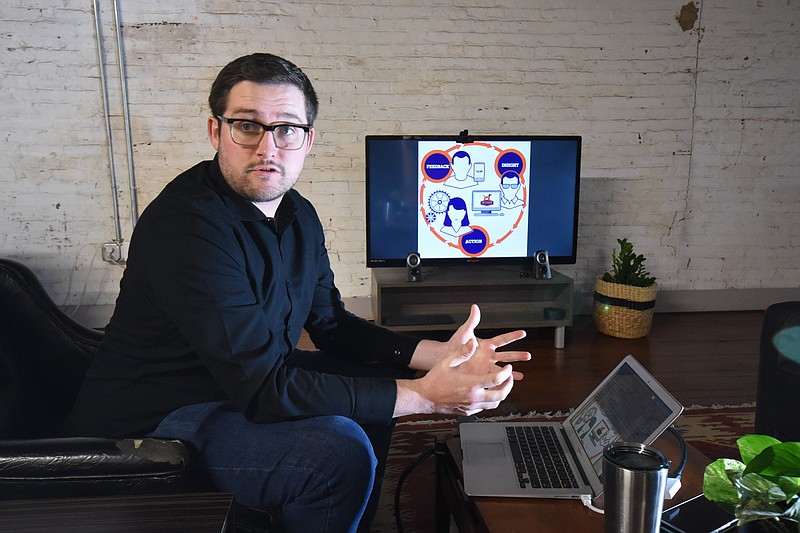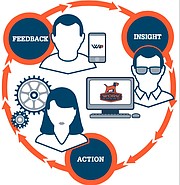When WorkHound co-founders Max Farrell and Andrew Kirpalani launched their start-up company in Des Moines, Iowa, the idea wasn't necessarily to work only with trucking companies, Farrell said.
Shortly after their idea formed for a feedback software that would allow workers to anonymously post their concerns to employers, it became clear that front-line workers, like truck drivers, could be the people to benefit the most from their product.
In 2018, the average turnover rate at some of the largest truckload carriers in the country is 95 percent, and Farrell said it can cost roughly $8,000 to replace a driver. In manufacturing, it can cost $4,000 to replace a worker and a staggering $35,000 to retrain and hire a worker in specialized health care industries, he said.
"The goal was to start to tackle some of the big workforce challenges in the American company, and trucking just happened to be a really great industry for us to get the company off the ground," Farrell said.
Now, two years after starting at the Lamp Post Group and participating in the Dynamo Accelerator, WorkHound's feedback software is being used by roughly 40 trucking companies nationwide, they have grown their revenue ten-fold and the co-founders are now planning to expand into new industries in 2019 and add to their nine-person team divided between their two offices in Des Moines and Chattanooga's Innovation District.
While Kirpalani is based in Des Moines with the software team, Farrell runs the show at their office on Cherry Street. Now in their "growth mode," Farrell said, the company is hoping to double or triple the size of their team in 2019.
The way WorkHound works is simple. No matter where a driver is or what time of day, the driver can use their phone to use WorkHound and answer two simple questions. They are asked how they feel about their job at that moment on a scale of 1 to 10, with 10 being amazing, and then they are prompted to write about the problem they are having at the moment. If an employer sees their feedback and wants to know more, they can hit a "request" button and ask the employee to reveal themselves so they can resolve the situation.
"When we started the company, we knew a lot of turnover happens over trivial issues where a guy could be happy on Tuesday, fed up on Wednesday and quit by the end of the week," Farrell said. "Companies needed to be more proactive than reactive, and we wanted to help companies address issues that are falling through the cracks."
In 2019, WorkHound will move into adjacent industries and will be expanding their software to thousands of diesel technicians that work for one of the largest truck stop companies in the country, Farrell said. In the future, he said they hope to expand to front-line workers such as home health nurses and manufacturing employees who might be isolated from a central office.
Staying loyal to their base though, WorkHound will continue to grow in the trucking industry, too.
"I think one of the things that has been refreshing for us as we have grown this company is that companies are using this feedback as operational intelligence," Farrell said, citing Wisconsin-based client Marten Transport. "What we know in the modern-day workforce is that front-line employees are an asset and their feedback is a goldmine."
For Workhound client Marten Transport, which is one of the 50 largest truck carriers in the country, the software helped them make some big policy changes to not only help with retention but with recruitment of drivers, too.
Lars Offerdahl, Marten's recruiting director, said about 2,000 drivers use it within the company and he has found that most people are willing to let them fix isolated issues.
"It's these small wins that turn into really big wins - that adds up really fast," he explained. "You save one guy at a time and over a month you save 30 guys. That turns into savings of hundreds of thousands dollars."
At Marten, it led to the creation of a new pet policy after several drivers voiced on the WorkHound system that they would like to bring their furry friends on the road with them. Before WorkHound, Marten didn't realize the number of drivers who felt strongly about the issue. Offerdahl said they also have started putting XM radios in new trucks based on driver feedback.
"Any company that has it should be prepared to have some thick skin and be ready to hear it and take action," Offerdahl said. "It's just like any survey, and if you don't do anything with the information you are given then you are wasting time."
Contact staff writer Allison Shirk Collins at ashirk@timesfreepress.com, @AllisonSCollins or 423-757-6651.

